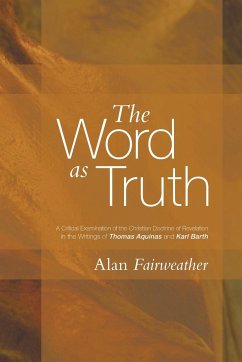This essay offers a critical appreciation and comparison of the theological and philosophical position of Karl Barth and St. Thomas Aquinas. Mr. Fairweather's thesis is the essential mediacy of God's self-presentation to men. He maintains, as against Aquinas, that human finitude does not preclude acquaintance with the divine nature; and as against Barth, that man through grace is truly capax verbi Domini. In his comparison the scales are weighted heavily against Barth. He maintains that Barth's presuppositions (e.g., the radical discontinuity of the human and the divine), arise from a Manichaean rather than from a Christian source; and that, carried to the extremes to which Barth is prepared at times to carry them, they rob the Bible of all value for revelation; the Incarnation and the Cross of all value for human life; and the idea of revelation itself of any kinship with the idea of Truth. At the same time, while pointing out the extravagances, dangers and interior contradictions of the Barthian position, Mr. Fairweather recognizes the corrective value of his absolutist theology, and concludes that the Thomist position as regards revelation, though it is the more soundly based of the two, needs to be supplemented by the Barthian emphasis on the real presence of God in His Word.
Bitte wählen Sie Ihr Anliegen aus.
Rechnungen
Retourenschein anfordern
Bestellstatus
Storno

